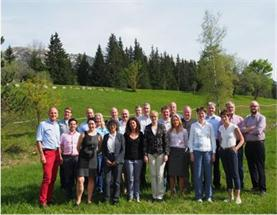CEA-Leti today announced the launch of the European Nano-Characterisation Laboratory (EU-NCL) funded by the European Union’s Horizon 2020 research and innovation programme.
 EU-NCL team during kick-off meeting
EU-NCL team during kick-off meeting
Its main objective is to reach a level of international excellence in nanomedicine characterisation for medical indications like cancer, diabetes, inflammatory diseases or infections, and make it accessible to all organisations developing candidate nanomedicines prior to their submission to regulatory agencies to get the approval for clinical trials and, later, marketing authorization.
“As reported in the ETPN White Paper, there is a lack of infrastructure to support nanotechnology-based innovation in healthcare,” said Patrick Boisseau, head of business development in nanomedicine at CEA-Leti and chairman of the European Technology Platform Nanomedicine (ETPN). “Nanocharacterisation is the first bottleneck encountered by companies developing nanotherapeutics. The EU-NCL project is of most importance for the nanomedicine community, as it will contribute to the competiveness of nanomedicine products and tools and facilitate regulation in Europe.”
EU-NCL is partnered with the sole international reference facility, the Nanotechnology Characterization Lab of the National Cancer Institute in the U.S. (US-NCL), to get faster international harmonization of analytical protocols.
“We are excited to be part of this cooperative arrangement between Europe and the U.S.,” said Scott E. McNeil, director of U.S. NCL. “We hope this collaboration will help standardize regulatory requirements for clinical evaluation and marketing of nanomedicines internationally. This venture holds great promise for using nanotechnologies to overcome cancer and other major diseases around the world.”
EU-NCL is also closely connected to national medicine agencies and the European Medicines Agency to continuously adapt its analytical services to requests of regulators. EU-NCL is designed, organized and operated according to the highest EU regulatory and quality standards.
This project is important for Europe, as it will be the first transnational infrastructure in nano-medicine. It aims at fostering innovation by sharing knowledge and technologies between academia and industry.
The mission of EU-NCL is:
- To provide a trans-disciplinary testing infrastructure covering a comprehensive set of preclinical characterisation assays (physical, chemical, in-vitro and in-vivo biological testing), allowing researchers to fully comprehend the biodistribution, metabolism, pharmacokinetics, safety profiles and immunological effects of their medicinal nano-products.
- To foster the use and deployment of standard operating procedures (SOPs), benchmark materials and quality management for the preclinical characterisation of medicinal nano-products.
- To promote intersectoral and interdisciplinary communication among key drivers of innovation, especially between developers and regulatory agencies.
This project, led by CEA-Tech (Leti and Liten, FR), brings together nine partners from eight countries:
- Joint Research Centre - European Commission (IT)
- European Research Services GmbH (DE),
- Leidos Biomedical Research, Inc. (U.S.)
- Trinity College Dublin (IE)
- Stiftelsen SINTEF (NO)
- University of Liverpool (UK)
- EMPA (CH) and
- Gesellschaft für Bioanalytik Münster (GE).
Within EU-NCL, six analytical facilities will offer transnational access to their existing analytical services for public and private developers, and will also develop new or improved analytical assays to keep EU-NCL at the cutting edge of nanomedicine characterisation.
EU-NCL is funded by the European Commission for a four-year period, with nearly 5 million euros allocated.